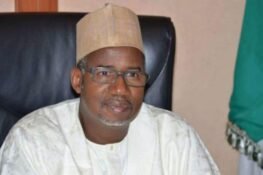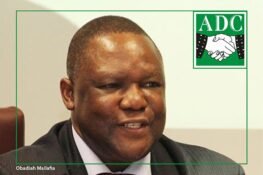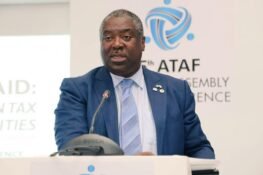On a good day, Abimbola Adelakun is a compelling read. But writers do have dry days, when the muse fails the quill abysmally. Such must have been the misfortune of the columnist in her April 23 outing.
The tragedy was however not her failure to deliver; the real catastrophe was actually the pedestrian intellection unwittingly exposed within a spell of creative drought.
In the said Punch column entitled “Why are Nigerians still so poor?”, Adelakun resumed her pillory of just any institution, idea – just anything Nigerian, other than her own fancy. The raging Coronavirus pandemic would seem to present yet another opportunity to mercilessly pound her favorite of all – the Buhari administration.
In the service of mischief, facts can, of course, either be creatively twisted or exaggerated mindlessly.
The more outlandish the easier to hit a target. So, an official directive to the Central Bank that a category of importers be denied forex allocation for food staples on which local farmers were thought to have achieved market saturation was generalized audaciously by Adelakun to mean a national claim of total food security!
Well, such has to be established as the theoretical foundation, however ramshackle, for a premeditated bombardment.
Her entire fulmination can, in fact, be winnowed into two broad submissions. One, she pounced upon the latest reports of “hunger in the land” within three weeks of lockdown of a section of the country, to boldly underline the falsity of her earlier self-manufactured claim of “national food security“ in an orgy of brazen intellectual masturbation.
Hear our emergency economist playing to the gallery thereafter: “How did we go from a country that said it had achieved food security to one where thousands of Nigerians are now unabashedly slamming their bank account number on social media and begging for alms from strangers? We have always been a poor country, that much is certain, but how did things get this bad for us?”
Seriously?
By the referenced pedestrian claim, the columnist only succeeded in giving herself away as utterly bereft of the real issues.
At a time when even kindergarten pupils are forced to stay at home on account of the rampaging Coronavirus that has disrupted the pre-existing social order, how amazing that a supposedly informed columnist fails to realize that what is at play is the telltale sign of economic shut-down.
The art of wealth-creation consists of the exertions of both skilled and non-skilled workers, all things being equal. Lockdown means demobilizing the engine that creates wealth. Even secondary-school Economics students know this.
So, if Adelakun truly hears and understands the mob she is so eager to incite in Nigeria, she would know that the cry is essentially about empty pockets, not scarcity of food. Which is not surprising for a national economy still operating at the subsistence level.
Most folks live from hand to mouth. Added to this unfortunate population are the unemployed, the beggars and others. So, not having the chance to eke a living means they are no longer capable of the means to purchase goods and services available.
An obsession to often relativize Diaspora and homeland without regard for cultural contexts simply to validate pre-conceived notion of fatherland Nigeria as “hopelessly useless”; a fixation shared unfortunately by a countless others offshore who, in truth, are actually afflicted by a neurosis that can be diagnosed roughly as acute inferiority complex arising from sustained neo-colonial brainwashing.
Against this backcloth, it therefore becomes easier to recognize the gravity of the danger posed to society by the propagation of falsehood or misinforming the multitude. The kind constituted by those willfully inflicting their point of view with the zealotry of the biblical Pharisees with virulence as deadly as the dark pathogens of Covid-19.
By the way, Adelakun is known to be ensconced in faraway United States, from where she regularly launches her missiles against moving and immobile targets in Nigeria.
In what looks more like act of commission than oversight, it is observed that, in this particular literary misadventure, the columnist uncharacteristically avoided drawing foreign parallels. (An obsession to often relativize Diaspora and homeland without regard for cultural contexts simply to validate pre-conceived notion of fatherland Nigeria as “hopelessly useless”; a fixation shared unfortunately by a countless others offshore who, in truth, are actually afflicted by a neurosis that can be diagnosed roughly as acute inferiority complex arising from sustained neo-colonial brainwashing.)
But one can, at least, assume that the columnist has access to television or internet to view the world from whichever part of America the ongoing lockdown caught her.
One then wonders how she will classify the over 26 million Americans who had already filed for economic benefits (at this writing Thursday, April 23) within the three-week lockdown? Or the growing food queues all over the acclaimed “God’s own country” for that matter? Would Adelakun also interpret that to mean “hunger” or the end of “food security” in America?
At this writing, the Trump administration was proposing fresh $1 trillion for small businesses aside another $2.5 trillion already appropriated in a massive stimulus package to save businesses and jobs as a result of unprecedented challenges brought about by Covid-19 pandemic.
The second leg of Adelakun’s diatribe was to discredit in its entirety the social investment programme (SIP) including the “conditional cash transfer” to the aged and poorest of the poor.
By her own warped notion of economic re-engineering, beneficiaries of Tradermoni and Marketmoni ought to be financially fortified by now to be counted among those beyond the “hunger” unleashed by Covid-19 lockdown.
Hear our economic guru again: “By that calculation, those that were given N10,000 loan in September 2018 should have had their lives significantly improved enough to be repaying a N30,000 loan by now.
Their standard rate of living should have, statistically at least, gone up by 200 percent and that should have had an appreciable multiplier effect on the rest of the country. Yet, here we are, people are too poor to adhere to a pandemic-mandated lockdown for even a few days. How come our system cannot withstand even a month of disruption?”
Again, it is unknown what Adelakun will tell us why America where she is holed, often touted the biggest economy with understandably one of the highest incomes per capital in the world, therefore a giant compared to the ant misnamed Nigeria, too unraveled within the same time-frame such that over 26 millions had fallen on the dough.
Of course, nothing can be more reflective of a poor understanding of the SIP idea and the succor intended to bring to the most vulnerable in the society. For clarity, what inspired Tradermoni and Marketmoni from outset was a thought to proliferate and drive entrepreneurship. While sums ranging from N10,000 to N100,000 may be peanuts to the likes of Adelakun, it is a quite a big deal for lots of folks out there without property or asset to put down as collateral to loan sharks.
Ultimately, the objective of the programme is to spare the petty traders such ordeal. Note, contrary to the estimation of the likes of Adelakun, the process of lifting a vast number from crushing poverty is unlikely to be completed within one election cycle.
Again, it is unknown what Adelakun will tell us why America where she is holed, often touted the biggest economy with understandably one of the highest incomes per capital in the world, therefore a giant compared to the ant misnamed Nigeria, too unraveled within the same time-frame such that over 26 millions had fallen on the dough.
History teaches that such lofty aspiration can only be realized not just through the honesty of leadership but also policy consistency over a reasonable time-frame.
From Muhammad Yunus we learnt the power of micro-credit loans. The Bangladeshi banker began by offering as little as $20 (less than N8,000) loan to local people, mostly women, to begin a trade in the 80s, propelled by a vision to “create economic and social development from below”.
With consistency, the scheme succeeded in transforming vast number of hitherto excluded, if not complete destitute, into entrepreneurs, thereby helping to transform the communities and banish poverty. So transformative was Yunus’ effort in birthing a new generation of entrepreneurs that he was found worthy of the award of Nobel Peace Prize in 2006.
But in their desperation to throw the baby away with the bathwater, intemperate enemies of Tradermoni and Marketmoni like Adelakun fail to proffer a viable alternative given our very peculiar circumstances, as against the option of sustaining the old culture of pocketing the national budget by a few.
Of course, no sane mind would entirely dismiss Adelakun’s concern over the integrity of the list of beneficiaries. Let a national conversation continue with a view to formulating a mechanism for a more scrupulous oversight.
But from the insights provided recently by Mrs. Maryam Uwais (Special Adviser to the President on SIP), we should, at least, recognize that among those bad-mouthing the SIP all along are those who had failed in their bid to parlay the power of the legislature to force its handlers to “carry them along” (euphemism to share the money or be allowed to name those to benefit in their constituencies).
Indeed, these are extra-ordinary moments in human history when patriotism should compel national solidarity to proffer workable solutions against a common enemy. We have, so far, seen worthy examples of sacrificial contributions and public spiritedness from all walks of Nigerian life, both in the public and private sectors.
Contributions to this national effort should however not be material alone. Freelance mischief-makers peddling falsehood and career hate entrepreneurs can also join the ongoing national effort by simply engaging in one civic rite: either resting their hyper-active dane guns in the rafter or quarantining their mouths from the public space.
Louis Odion is the Senior Technical Assistant on Media to President Muhammadu Buhari.








